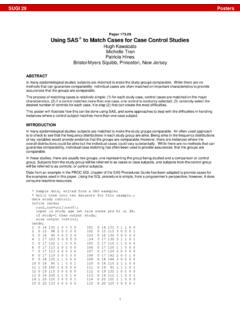Transcription of CONSTITUTIONAL COURT OF SOUTH AFRICA …
1 CONSTITUTIONAL COURT OF SOUTH AFRICA Case CCT 131/12 [2013] ZACC 23 In the matter between: imraahn ismail mukaddam Applicant and PIONEER FOODS (PTY) LTD First Respondent TIGER CONSUMER BRANDS LIMITED Second Respondent PREMIER FOODS LIMITED Third Respondent and LEGAL RESOURCES CENTRE Amicus Curiae Heard on : 7 May 2013 Decided on : 27 June 2013 JUDGMENT JAFTA J (Moseneke DCJ, Bosielo AJ, Khampepe J, Nkabinde J and Zondo J concurring): JAFTA J 2 Introduction [1] In our CONSTITUTIONAL dispensation everyone is guaranteed access to a competent COURT to have their dispute resolved by the application of law and decided in a fair But this guarantee does not include the right to choose the method of approaching and placing a dispute before a particular COURT .
2 The determination of the process to be followed when litigants approach courts is left in the hands of the courts. [2] Section 173 of the Constitution recognises and preserves the courts power to determine how disputes are to be placed before Our superior courts enjoyed this power even before the adoption of the This case concerns the exercise of this power by the Western Cape High COURT , Cape Town (High COURT ) in circumstances where the applicant sought permission to institute a class action against the respondents.
3 The claims to be pursued are for the payment of damages allegedly suffered by members of a particular class as a result of certain conduct by the respondents. The facts and litigation history [3] The applicant in this application for leave to appeal is Mr imraahn ismail mukaddam . At the relevant period, he carried on the business of distributing bread in the Western Cape. He purchased bread from some of the respondents who are major 1 Section 34 of the Constitution provides: Everyone has the right to have any dispute that can be resolved by the application of law decided in a fair public hearing before a COURT or, where appropriate, another independent and impartial tribunal or forum.
4 2 The full text of section 173 is quoted in [33] below. 3 Then the source of the power was the common law. JAFTA J 3 bread producers, and sold it to informal traders from whom consumers bought their bread. The record shows that there were approximately 100 distributors like the applicant in the Western Cape. [4] The respondents are Pioneer Foods (Pty) Ltd (Pioneer Foods), Tiger Consumer Brands Limited (Tiger Brands) and Premier Foods Limited (Premier Foods). All are producers of bread from whom the applicant and other distributors sourced their supplies.
5 However, the respondents businesses are not confined to the Western Cape Province. They trade throughout the country. [5] In 2006 the Competition Commission launched an investigation against the respondents, following complaints that they were involved in anti-competitive behaviour in dealing with bread distributors in the Western Cape. The applicant was one of the individuals who submitted complaints to the Commission. The investigation was undertaken in terms of the Competition Premier Foods sought leniency from the Commission and came forward with the disclosure of how it had engaged in anti-competitive conduct with the other respondents in violation of the Competition Act.
6 The Commission has a corporate-leniency policy in terms of which business entities who cooperate in its investigations are rewarded with the imposition of lenient 4 89 of 1998. 5 Agri Wire (Pty) Ltd and Another v Commissioner of the Competition Commission and Others [2012] ZASCA 134; [2012] 4 All SA 365 (SCA). JAFTA J 4 [6] The disclosure by Premier Foods led to the expansion of the Commission s investigation to other parts of the country. Tiger Brands was among the entities implicated in the disclosure.
7 It negotiated and concluded a settlement agreement with the Commission in relation to unlawful conduct in the Western Cape and other parts of the country. A penalty of nearly R99 million was imposed on Tiger Brands. [7] The complaints against Pioneer Foods were referred to the Competition Tribunal for adjudication. A lengthy hearing ensued which culminated in Pioneer Foods being found guilty of anti-competitive conduct in breach of the Competition Act. Approximately R196 million in penalties were imposed on it.
8 In the High COURT [8] The applicant and two other persons6 instituted an application in the High COURT for certification authorising them to bring a class action against the respondents. The application was opposed by the respondents. [9] In deciding whether to grant certification or not, the High COURT focussed on two requirements only. First, it considered whether the cause of action identified by the applicants raised triable issues. But in this regard the High COURT looked at only two of the three causes of action mentioned in the applicants founding papers.
9 With regard to the claim for damages based on section 22 of the Constitution, the High COURT held that the section affords protection to individual citizens and not corporate 6 One of the parties was a juristic person. JAFTA J 5 entities. No ruling was made in relation to the present applicant and another litigant, both natural persons. [10] The second requirement considered by the High COURT was whether common issues of fact or law would be raised in the proposed class action.
10 Regarding the applicant, the High COURT considered the arguments made in support of contractual claims. The applicant alleged that Pioneer Foods and Premier Foods had breached agreements he had with them for the supply of bread. The COURT compared these claims to those of the other two applicants and concluded that the issues to be raised were different. Accordingly certification was refused. [11] The High COURT overlooked a third cause of action mentioned in the papers.














